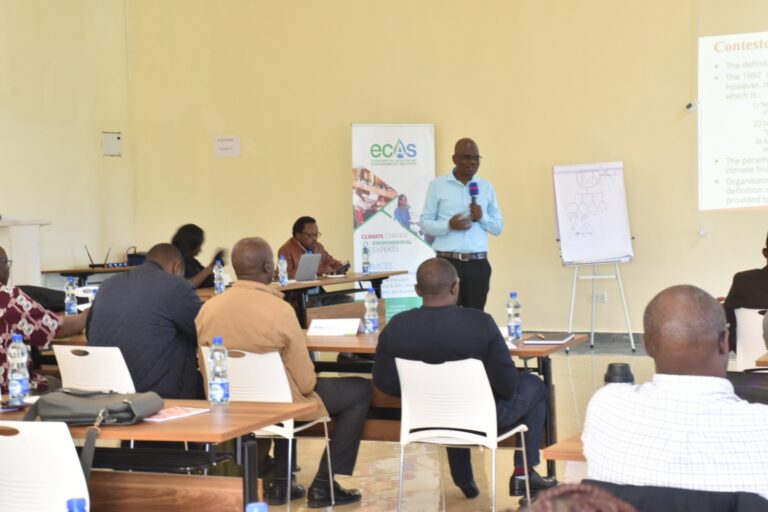
CONCEPT NOTE
INTERNATIONAL TRAINING ON EVALUATION AND IMPACT ASSESSMENT OF POLICIES AND PROJECTS
COURSE BACKGROUND
In the face of growing development challenges and environmental uncertainties across Africa, governments, NGOs, and development partners are increasingly held accountable for demonstrating the value, effectiveness, and impact of their policies and projects. This has amplified the demand for robust evaluation and impact assessment skills, particularly in sectors influenced by climate change, resource management, and sustainable development.
The Environmental Capacities and Sustainability Institute (ECAS) recognizes the critical role of evidence-based decision-making in shaping effective policies and ensuring the sustainable use of resources. In response, ECAS designed this course to bridge the gap between policy intent and real-world outcomes—focusing on skills needed to measure, interpret, and communicate the impacts of interventions.
By grounding the course in the African development context, ECAS ensures participants are exposed to locally relevant case studies, regional regulatory frameworks, and climate-sensitive evaluation approaches. Participants are trained not just to assess whether a project succeeded, but why it did or didn’t, what lessons can be learned, and how future initiatives can be improved.
This course empowers professionals to conduct comprehensive evaluations and impact assessments, enabling organizations to learn, adapt, and optimize their strategies to ensure inclusive, sustainable, and resilient development outcomes.
COURSE OBJECTIVES OF THE TRAINING
This course is designed to:
- Equip participants with knowledge of evaluation and impact assessment concepts, frameworks, and standards.
- Enhance the ability to design and apply qualitative and quantitative evaluation methodologies.
- Strengthen participants’ skills in developing logic models and theories of change.
- Guide learners in the ethical and strategic use of evaluation findings for policy-making, accountability, and learning.
WHAT YOU WILL LEARN
Participants will gain:
- A comprehensive understanding of evaluation types, designs, and tools.
- The ability to collect, analyze, and interpret both qualitative and quantitative data.
- Practical skills in developing indicators, baseline studies, and performance tracking systems.
- Insights into integrating evaluation into the full policy or project lifecycle.
- Communication techniques for sharing findings with stakeholders to maximize use and influence.
DURATION AND PROGRAM
TARGET PARTICIPANTS
This course is tailored for professionals involved in the design, implementation, monitoring, and evaluation of public policies and development projects. These include government officials, policy analysts, M&E specialists, program and project managers, development practitioners, and consultants working with international organizations, NGOs, and research institutions. It is also highly suitable for academics, researchers, and graduate-level students who aim to deepen their practical knowledge of evaluation and impact assessment methodologies and applications in real-world contexts.
TRAINING STYLE
The modules will be taught through PowerPoint presentations, and lectures and will
include a case study/field visit, breakout sessions, case studies and other interactive discussion components.
The course will also include a few guest speakers, both in person and via Zoom and other online learning platforms for overseas speakers. This provides useful real-world insights alongside the more theoretical aspects of the course.
The conference faculty shall consist of experienced decision makers, as well as practitioners and representatives from established educational and research institutions active around climate change, engineering and international development. Throughout the course, theoretical presentation of concepts will be moderated and more group discussions and plenary engagements will be optimized.
PowerPoint presentations will be made by facilitators and resource persons, to highlight key concepts before embarking on group work.
TRAINING MODULES
| No | Module | Details | |
| 1. | Foundations of Evaluation and Impact Assessment |
Objective: Introduce key concepts, purposes, and principles of evaluation in development and environmental contexts. The key topics include:
|
|
| 2. | Designing Effective Evaluation Frameworks |
Objective: Equip learners with tools for structuring and planning evaluations. The key topics include:
|
|
| 3. | Data Collection and Management |
Objective: Learn to design, collect, and manage data effectively for evaluation purposes. The key topics include:
|
|
| 4. | Environmental and Social Impact Assessment (ESIA) |
Objective: Explore environmental and social considerations in policy and project evaluations. The key topics include:
|
|
|
5.
|
Data Analysis and Interpretation |
Objective: Develop capacity to analyze evaluation data and draw evidence-based conclusions. The key topics include:
|
|
| 6. | Communicating Evaluation Findings |
Objective: Enhance skills in presenting and using evaluation results for learning and decision-making. The key topics include:
|
|
| 7. |
Practical Case Study & Field Simulation |
Objective: Apply learning through real-life simulation or project-based assessment. The key topics include:
|
|
9. GENERAL NOTES
- Training manuals and additional reference materials are provided to the participants.
- Upon successful completion of this course, participants will be issued with a certificate.
- We can also do this as a tailor-made course to meet organization-wide needs. Contact us to find out more: info@ecasiafrica.org.
- Payment should be sent to our bank account before the start of training and proof of payment sent to: info@ecasiafrica.org.
ABOUT ECAS INSTITUTE
The ECAS Institute designs and delivers independent and targeted training, research, and consulting services. Our work focusses on climate change and resilience building, carbon markets, renewable energy, nature-based solution, biodiversity conservation, agriculture and food systems, We are located in Nairobi Kenya and work across the African region. We have implemented training and research assignments in Kenya, Tanzania, Uganda, South Sudan, Somalia, Malawi, Rwanda, Congo, and South Africa. Globally, we have supported our partners from the UK, Denmark, Italy, Sweden, Germany, and USA.

